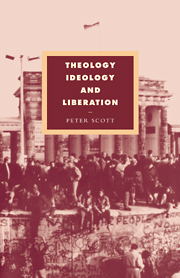3 - Against idolatry: two protocols
Published online by Cambridge University Press: 05 December 2011
Summary
The next two chapters are an exercise in theological selfcriticism in order to secure some awareness of the determining context that impinges upon theological construction: liberating theology from the prison of ideology. The argument of these two chapters is, above all, an attempt to ensure that the use of the word ‘God’ is not idolatrous. If the theological protocols for such non-ideological and so non-idolatrous uses might be persuasive, the way will be open for the more ‘positive’ proposal of part III.
This chapter responds specifically to Marx's charge of Christianity as an intermediary: theology only offers an account of God through which, in ways that are ideological, human beings interpret themselves to themselves. I argue (in the next two sections) that an important ‘protocol against idolatry’ (Lash) is the decentring of the subject, human and divine. Theology does not fund accounts of centred stability (of individuality, race, nation, economy, gender). I also suggest (in sections III and IV) that this decentred movement needs to be interpreted carefully if it is to make a contribution toward a theology that is neither too close nor too distant; featured here are issues of agency and language. The second part of the chapter is concerned with the simplicity of God: a further protocol which attempts to secure an adequate way of distinguishing God from the world as a safeguard against the misconstrual of human capacities in relation to a God who is too ‘immanent’.
- Type
- Chapter
- Information
- Theology, Ideology and Liberation , pp. 75 - 109Publisher: Cambridge University PressPrint publication year: 1994



